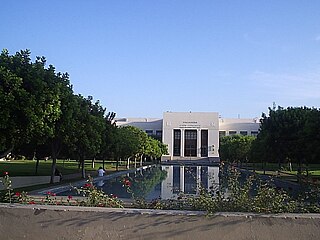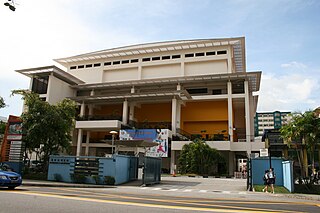Cambridge Institute is a private post-secondary school in Singapore. It was established in 1996 and now has 2,000 full-time students and 150 staff. It has no connection with Cambridge University (UK). The main campus is in the city's central business district, with two branches elsewhere.

Singapore, officially the Republic of Singapore, is an island city-state in Southeast Asia. It lies one degree north of the equator, at the southern tip of the Malay Peninsula, with Indonesia's Riau Islands to the south and Peninsular Malaysia to the north. Singapore's territory consists of one main island along with 62 other islets. Since independence, extensive land reclamation has increased its total size by 23%. The country is known for its transition from a developing to a developed one in a single generation under the leadership of its founder Lee Kuan Yew.
Contents
It has been awarded the Singapore Quality Class (SQC) for Private Education Organizations, and its native-speaker language teachers have been approved by the Singapore Ministry of Education. SQC is an initiative under the Singapore Government's Education Excellence Framework. [1]
Cambridge Institute is geared to the needs of foreign students. Most are studying English. The school handles, on behalf of the student, applications to the Immigration and Checkpoints Authority for a Student's Pass enabling residence in Singapore for the duration of the course. The school will also act as the student's sponsor if required and organise airport reception, opening a bank account, etc.

English is a West Germanic language that was first spoken in early medieval England and eventually became a global lingua franca. It is named after the Angles, one of the Germanic tribes that migrated to the area of Great Britain that later took their name, as England. Both names derive from Anglia, a peninsula in the Baltic Sea. The language is closely related to Frisian and Low Saxon, and its vocabulary has been significantly influenced by other Germanic languages, particularly Norse, and to a greater extent by Latin and French.

The Immigration and Checkpoints Authority is the border control agency of Singapore. It is a department in the Ministry of Home Affairs. ICA is responsible for securing Singapore's checkpoints against the entry of undesirable goods and people. The current commissioner of ICA is Mr. Marvin Sim.
The school has overseas representative offices in Hanoi (Vietnam) and Shenyang (China).

Hanoi is Vietnam's capital and second largest city by population. The city mostly lies on the right bank of the Red River. Hanoi is 1,720 km (1,070 mi) north of Ho Chi Minh City and 105 km (65 mi) west of Haiphong.

Shenyang, formerly known by its Manchu name Mukden or Fengtian, is the provincial capital and the largest city of Liaoning Province, People's Republic of China, as well as the largest city in Northeast China by urban population. According to the 2010 census, the city's urban area has 6.3 million inhabitants, while the total population of the Shenyang municipality, which holds the administrative status of a sub-provincial city, is up to 8.1 million. Shenyang's city region includes the ten metropolitan districts of Shenyang proper, the county-level city of Xinmin, and two counties of Kangping and Faku.
A Student Protection Scheme is in place, as stipulated by the Consumers Association of Singapore (CASE). As one of the largest operators in the private education sector, Cambridge Institute has welcomed government proposals for new stricter regulation of such schools, following a spate of sudden closures of private schools. Edwin Chan, Principal of Cambridge Institute, said it was "high time" the rules were made stricter. [2]













